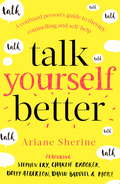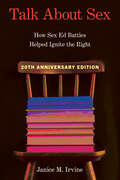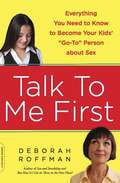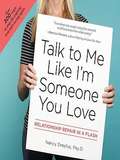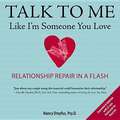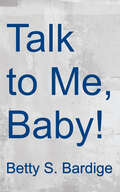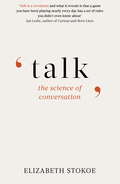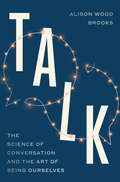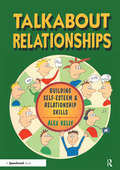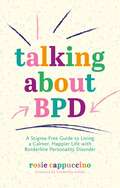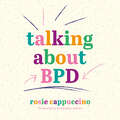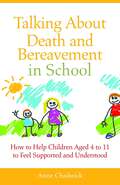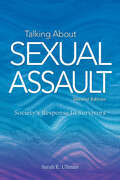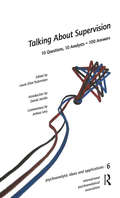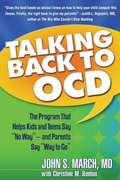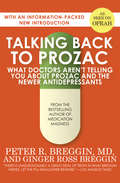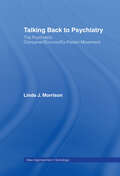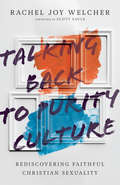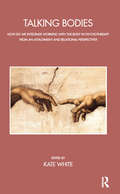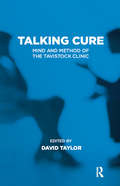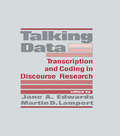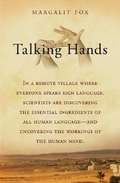- Table View
- List View
Talk Yourself Better: A Confused Person's Guide to Therapy, Counselling and Self-Help
by Ariane Sherine'Brilliant - makes a baffling world comprehensible' - Jeremy Vine'It's everything you didn't know about therapy or were afraid to ask, but by no means the daunting read you might imagine. Sherine, an award-winning comedian and writer for TV and radio, has persuaded such people as Stephen Fry, David Baddiel and Dolly Alderton to write warts-and-all pieces for the book about their struggles with mental health' - The TimesSo you've decided you want to try therapy. But which type of therapy is best for you? Do you know your CBT from your DBT, your cognitive analytic therapy from your psychoanalysis? Talk Yourself Better cuts through the confusion when it comes to choosing a therapist. Exploring all the different kinds of therapy available, Ariane Sherine offers an entertaining insight into each type, including interviews with celebrities, writers and therapists themselves to help make taking that first step a whole lot easier.· Funny and clear Q&A sections guide you through the differences between therapies· Real life stories give an honest account of the pros and cons of each form of therapy· Therapist interviews give an insight into why a counsellor would champion their chosen form of practice· Features contributions from household names such as Stephen Fry, Charlie Brooker, Dolly Alderton and David Baddiel.This is an essential overview of the bewildering range of options available to you when you want to solve a psychological or emotional problem. Friendly and accessible, Talk Yourself Better stresses the importance of talk therapy in improving your mental health.
Talk Yourself Better: A Confused Person's Guide to Therapy, Counselling and Self-Help
by Ariane Sherine'Brilliant - makes a baffling world comprehensible' - Jeremy Vine'It's everything you didn't know about therapy or were afraid to ask, but by no means the daunting read you might imagine. Sherine, an award-winning comedian and writer for TV and radio, has persuaded such people as Stephen Fry, David Baddiel and Dolly Alderton to write warts-and-all pieces for the book about their struggles with mental health' - The TimesSo you've decided you want to try therapy. But which type of therapy is best for you? Do you know your CBT from your DBT, your cognitive analytic therapy from your psychoanalysis? Talk Yourself Better cuts through the confusion when it comes to choosing a therapist. Exploring all the different kinds of therapy available, Ariane Sherine offers an entertaining insight into each type, including interviews with celebrities, writers and therapists themselves to help make taking that first step a whole lot easier.· Funny and clear Q&A sections guide you through the differences between therapies· Real life stories give an honest account of the pros and cons of each form of therapy· Therapist interviews give an insight into why a counsellor would champion their chosen form of practice· Features contributions from household names such as Stephen Fry, Charlie Brooker, Dolly Alderton and David Baddiel.This is an essential overview of the bewildering range of options available to you when you want to solve a psychological or emotional problem. Friendly and accessible, Talk Yourself Better stresses the importance of talk therapy in improving your mental health.
Talk about Sex: How Sex Ed Battles Helped Ignite the Right (Sexuality Studies)
by Janice IrvinePraise for Talk about Sex “Must reading for scholars, sexuality researchers, activists, and public policy and public health planners engaged in efforts to promote education on sex, sexually transmitted diseases, and HIV infection prevention for adolescents in schools.”—JAMA Talk about Sex is a rich social history about the political transformations, cultural dynamics, and emotional rhetorical strategies that helped the right wing manufacture controversies on the local and national levels in the United States. Although the emergence of a politicized Christian Right is commonly dated at the mid-seventies, with the founding of groups like the Moral Majority, Talk about Sex tells the story of a powerful right-wing Christian presence in politics a full decade earlier. These activists used inflammatory sexual rhetoric—oftentimes deceptive and provocative—to capture the terms of public debate, galvanize voters, and reshape the culture according to their own vision. This 20th Anniversary Edition includes a new preface and epilogue by the author that examines current controversies over public education on sexuality, gender, and race. Demonstrating how the right wing draws on the cultural power of sexual shame and fear to build a political movement, Talk about Sex explores the complex entanglements of sexual knowledge, politics, and discourses.
Talk about Sex: How Sex Ed Battles Helped Ignite the Right (Sexuality Studies)
by Janice IrvinePraise for Talk about Sex “Must reading for scholars, sexuality researchers, activists, and public policy and public health planners engaged in efforts to promote education on sex, sexually transmitted diseases, and HIV infection prevention for adolescents in schools.”—JAMA Talk about Sex is a rich social history about the political transformations, cultural dynamics, and emotional rhetorical strategies that helped the right wing manufacture controversies on the local and national levels in the United States. Although the emergence of a politicized Christian Right is commonly dated at the mid-seventies, with the founding of groups like the Moral Majority, Talk about Sex tells the story of a powerful right-wing Christian presence in politics a full decade earlier. These activists used inflammatory sexual rhetoric—oftentimes deceptive and provocative—to capture the terms of public debate, galvanize voters, and reshape the culture according to their own vision. This 20th Anniversary Edition includes a new preface and epilogue by the author that examines current controversies over public education on sexuality, gender, and race. Demonstrating how the right wing draws on the cultural power of sexual shame and fear to build a political movement, Talk about Sex explores the complex entanglements of sexual knowledge, politics, and discourses.
Talk to Me First: Everything You Need to Know to Become Your Kids' "Go-To" Person about Sex
by Deborah RoffmanWe live in a time when kids of all ages are bombarded with age-sensitive material wherever they turn; "sexting" and bullying are on the rise at an increasingly younger age, and teen moms are "celebrified. " What is a concerned--and embarrassed--parent to do? With wit, wisdom, and savvy, Deborah Roffman translates her experiences gleaned from decades of teaching kids and parents, and as a mom, into strategies to help parents navigate this tricky terrain. Talk to Me First is for any parent who wants to become and remain the most credible and influential resource about sexuality in their children's lives.
Talk to Me Like I'm Someone You Love
by Nancy DreyfusThe most crucial relationship advice book since Men Are from Mars." - Erin Meanley, Glamour.com A groundbreaking, interactive relationship tool that literally places in the hands of couples the power to transform chronically frustrating relationship dynamics. We've all been there. A conversation with a loved one escalates into conflict. Voices rise to a fever pitch and angry, accusative words fly through the air. At times like these, it seems impossible to find the magic words that will lead to healing. Enter Talk to Me Like I'm Someone You Love. A psychotherapist with decades of experience in counseling couples, Nancy Dreyfus hit upon the revolutionary practice outlined in this book during a couples-therapy session in which a wife's unrelenting criticism of her husband was causing him to become emotionally withdrawn. In the midst of this, Dreyfus found herself scribbling on a scrap of paper, "Talk to me like I'm someone you love" and gestured to the husband that he should hold it up. He did and within seconds the familiar power differential between the two shifted, and a gentler, more genuine connection emerged. Dreyfus was startled, then intrigued, and then motivated to create a tool that could help others. This elegantly packaged spiral-bound book features more than one hundred of Dreyfus's "flash cards for real life"-written statements that express what we wish we could communicate to the person we love, but either can't find the right words or the right tone in which to say it. The statements include: *Taking responsibility: "I realize I'm overreacting. Can you give me a minute to get sane again?" *Apologizing: "I know I've really hurt you. What can I do to help you trust me again?" *Loving: "You are precious, and I get that I haven't been treating you like you are." A one-of-a-kind, practical relationship tool, Talk to Me Like I'm Someone You Love will help couples to stop arguing and begin healing.
Talk to Me Like I'm Someone You Love: relationship repair in a flash
by Psy. D. Nancy DreyfusThe most crucial relationship advice book since Men Are from Mars. " - Erin Meanley, Glamour. com A groundbreaking, interactive relationship tool that literally places in the hands of couples the power to transform chronically frustrating relationship dynamics. We've all been there. A conversation with a loved one escalates into conflict. Voices rise to a fever pitch and angry, accusative words fly through the air. At times like these, it seems impossible to find the magic words that will lead to healing. Enter Talk to Me Like I'm Someone You Love. A psychotherapist with decades of experience in counseling couples, Nancy Dreyfus hit upon the revolutionary practice outlined in this book during a couples-therapy session in which a wife's unrelenting criticism of her husband was causing him to become emotionally withdrawn. In the midst of this, Dreyfus found herself scribbling on a scrap of paper, "Talk to me like I'm someone you love" and gestured to the husband that he should hold it up. He did and within seconds the familiar power differential between the two shifted, and a gentler, more genuine connection emerged. Dreyfus was startled, then intrigued, and then motivated to create a tool that could help others. This elegantly packaged spiral-bound book features more than one hundred of Dreyfus's "flash cards for real life"-written statements that express what we wish we could communicate to the person we love, but either can't find the right words or the right tone in which to say it. The statements include: *Taking responsibility: "I realize I'm overreacting. Can you give me a minute to get sane again?" *Apologizing: "I know I've really hurt you. What can I do to help you trust me again?" *Loving: "You are precious, and I get that I haven't been treating you like you are. " A one-of-a-kind, practical relationship tool, Talk to Me Like I'm Someone You Love will help couples to stop arguing and begin healing. .
Talk to Me, Baby!: How You Can Support Young Children's Language Development
by Betty S. BardigeWith Thirty Million Words and other early language initiatives making headlines, the message is clear: Talking to young children matters. But how you talk to children makes a big difference—and this friendly, down-to-earth guidebook shows you how to engage with kids in ways that directly support their language skills and overall development. <p><p>Developed by celebrated early education expert Betty Bardige, the second edition of this warm and wise book takes you on a fascinating tour through six stages in a child's language development—starting with baby babbles and ending with kindergarten literacy skills. You'll get critical new research and updates in every chapter, plus an invaluable toolbox of downloadable resources that help you put the strategies into practice. A must-have for all early childhood professionals and parents, this book is your guide to playful, engaging talk that supercharges young minds and sets the stage for school success.
Talk: The Science of Conversation
by Elizabeth StokoeWe spend much of our days talking. Yet we know little about the conversational engine that drives our everyday lives. We are pushed and pulled around by language far more than we realize, yet are seduced by stereotypes and myths about communication.This book will change the way you think about talk. It will explain the big pay-offs to understanding conversation scientifically. Elizabeth Stokoe, a social psychologist, has spent over twenty years collecting and analysing real conversations across settings as varied as first dates, crisis negotiation, sales encounters and medical communication. This book describes some of the findings of her own research, and that of other conversation analysts around the world. Through numerous examples from real interactions between friends, partners, colleagues, police officers, mediators, doctors and many others, you will learn that some of what you think you know about talk is wrong. But you will also uncover fresh insights about how to have better conversations - using the evidence from fifty years of research about the science of talk.
Talk: The Science of Conversation
by Elizabeth StokoeWe spend much of our days talking. Yet we know little about the conversational engine that drives our everyday lives. We are pushed and pulled around by language far more than we realize, yet are seduced by stereotypes and myths about communication.This book will change the way you think about talk. It will explain the big pay-offs to understanding conversation scientifically. Elizabeth Stokoe, a social psychologist, has spent over twenty years collecting and analysing real conversations across settings as varied as first dates, crisis negotiation, sales encounters and medical communication. This book describes some of the findings of her own research, and that of other conversation analysts around the world. Through numerous examples from real interactions between friends, partners, colleagues, police officers, mediators, doctors and many others, you will learn that some of what you think you know about talk is wrong. But you will also uncover fresh insights about how to have better conversations - using the evidence from fifty years of research about the science of talk.
Talk: The Science of Conversation and the Art of Being Ourselves
by Alison Wood BrooksA groundbreaking book that reveals the hidden architecture of our conversations and how even small improvements can have a profound impact on our relationships in work and life—from a celebrated Harvard Business School professor and leading expert on the psychology of conversation.&“Alison Wood Brooks brings to life the science of conversation, in which she is a world expert, with the utmost warmth, empathy, and joy.&”—Angela Duckworth, #1 New York Times bestselling author of GritAll of us can struggle with difficult conversations, but we&’re often not very good at the easy ones either. Though we do it all the time, Harvard professor Alison Wood Brooks argues that conversation is one of the most complex, demanding, and delicate of all human tasks, rife with possibilities for misinterpretation and misunderstanding. And yet conversations can also be a source of great joy, each one offering an opportunity to express who we are and learn who others are—to feel connected, loved, and alive.In Talk, Brooks shows why conversing a little more effectively can make a big difference in the quality of our close personal relationships as well as our professional success. Drawing on the new science of conversation, Brooks distills lessons that show how we can better understand, learn from, and delight each other. The key is her TALK Maxims:Topics: Choose topics and manage them wellAsking: Ask more questionsLevity: Use humor to keep conversations fizzyKindness: Prioritize their partners conversational needsThrough experiments ranging across the conversational spectrum—from speed daters who ask too few questions (or too many), to future business leaders averse to topic forethought, to traffic stops that reveal the essence of kind language—Brooks takes us inside the world of conversation, giving us the confidence and the advice to approach any interaction with more creativity and compassion.Addressing our face-to-face conversations as well as those we have by phone, email, text, and social media, Talk is a thoughtful guide for anyone seeking to better establish and sustain their relationships. From managing our emotions and sparking creativity to navigating conflict and being more inclusive, the right conversation skills just might be the key to leading a more purposeful life.
Talkabout Relationships: Building Self-Esteem and Relationship Skills (Talkabout #Vol. 3)
by Alex KellyThe third title in the successful "Talkabout" series, "Talkabout Relationships" reflects current literature and research on developing relationships for people with learning disabilities, and aims, through groupwork, to improve self-esteem and relationship skills in people who are having difficulties in making or maintaining friends. This highly illustrated, practical resource: is designed to help teachers or therapists to work through self-esteem and relationship skills within a group setting in a structured way. It was originally written for young adults with a learning disability, it has also been used successfully with children with learning disabilities and those who present with social skills difficulties. Includes a staff rating assessment of a client's relationship skills and criteria for inclusion in a relationships group, as well as a self-esteem assessment and a self-rating assessment of relationship skills. This title contains illustrated, photocopiable group activities and worksheets to address self-image, identity and self-confidence as well as the different types of relationship, the qualities of friends and some of the skills involved in improving and developing relationships. Illustrated by the author, this hands-on groupwork resource is ideal for speech language therapists, teachers, occupational therapists, community learning disability nurses and anyone working in the field of learning disability.
Talking About BPD: A Stigma-Free Guide to Living a Calmer, Happier Life with Borderline Personality Disorder
by Rosie Cappuccino'I am Rosie. I have BPD. I am not an attention-seeker, manipulative, dangerous, hopeless, unlovable, 'broken', 'difficult to reach' or 'unwilling to engage'. I am caring, creative, courageous, determined, full of life and love.'Talking About BPD is a positive, stigma-free guide to life with borderline personality disorder (BPD) from award-winning blogger Rosie Cappuccino.Addressing what BPD is, the journey to diagnosis and available treatments, Rosie offers advice on life with BPD and shares practical tips and DBT-based techniques for coping day to day. Topics such as how to talk about BPD to those around you, managing relationships and self-harm are also explored. Throughout, Rosie shares her own experiences and works to dispel stigma and challenge the stereotypes often associated with the disorder.This much-needed, hopeful guide will offer support, understanding, validation and empowerment for all living with BPD, as well as those who support them.
Talking About BPD: A Stigma-Free Guide to Living a Calmer, Happier Life with Borderline Personality Disorder
by Rosie Cappuccino'I am Rosie. I have BPD. I am not an attention-seeker, manipulative, dangerous, hopeless, unlovable, 'broken', 'difficult to reach' or 'unwilling to engage'. I am caring, creative, courageous, determined, full of life and love.'Talking About BPD is a positive, stigma-free guide to life with borderline personality disorder (BPD) from award-winning blogger Rosie Cappuccino.Addressing what BPD is, the journey to diagnosis and available treatments, Rosie offers advice on life with BPD and shares practical tips and DBT-based techniques for coping day to day. Topics such as how to talk about BPD to those around you, managing relationships and self-harm are also explored. Throughout, Rosie shares her own experiences and works to dispel stigma and challenge the stereotypes often associated with the disorder.This much-needed, hopeful guide will offer support, understanding, validation and empowerment for all living with BPD, as well as those who support them.(P) 2021 Jessica Kingsley Publishers
Talking About Death and Bereavement in School
by Ann ChadwickChildren experiencing bereavement are often confused, unprepared, and in need of help and support from those around them. It is important that school teachers and staff know how to respond to bereavement and how they can best help the child. This short, easy to read book offers simple but important advice and guidance for school teachers and staff on what to do when a child is grieving. It includes advice on explaining death to children, insights into how children may be feeling and how they may react, and ways in which they can be supported. The book also covers how bereavement can affect a child and how it can affect the whole school in the case of a death of a pupil or staff member. It also stresses the importance of teaching the facts of death to children and includes ideas on how to incorporate this into lessons. This book is ideal for all staff in a school setting who are in need of easily digestible and practical guidance on how to support children after bereavement.
Talking About Sexual Assault: Society's Response to Survivors (Psychology of Women Series)
by Sarah E. Ullman PhDThis second edition provides a comprehensive, social ecological review of women's rape and sexual assault disclosures and how support providers can better respond to them and challenge rape culture. Women who have been raped and sexually assaulted are often retraumatized by negative social reactions from family and friends, healthcare professionals, institutions, and society at large. Sarah Ullman educates supporters on more appropriate responses that empower survivors and help them heal. Drawing on interviews with survivors and support providers, she offers powerful, provocative insights to therapists, other frontline workers assisting survivors, researchers, and students. She reviews transtheoretical research on why, how often, and to whom women disclose; the impact of social contexts on disclosures; and social reactions from informal support networks and professionals in a variety of institutional settings. New to this edition is updated research addressing social media, social phenomena like the MeToo movement, and informal supporters&’ experiences with survivors. While most research still focuses on White, heterosexual, and cisgender women, emerging findings on LGBTQ+ individuals, cis males, people of color, and people with disabilities are reviewed where available.
Talking About Supervision: 10 Questions, 10 Analysts = 100 Answers (The International Psychoanalytical Association Psychoanalytic Ideas and Applications Series)
by Laura E. RubinsteinThis book offers us the wisdom of a distinguished group of international psychoanalysts about supervision and other aspects of the psychoanalytic training experience. It serves as a stimulus to our thinking about the most important aspect of psychoanalytic education.
Talking Back to OCD
by Christine Benton John MarchNo one wants to get rid of obsessive-compulsive disorder more than someone who has it. That's why Talking Back to OCD puts kids and teens in charge. Dr. John March's eight-step program has already helped thousands of young people show the disorder that it doesn't call the shots--they do. This uniquely designed volume is really two books in one. Each chapter begins with a section that helps young readers zero in on specific problems and develop skills they can use to tune out obsessions and resist compulsions. Dr. March demonstrates how to Create a nickname for the illness to remember that OCD isn't you Make a symptom chart so you can plan when and where to start talking back Break the disorder's rules about the rituals The pages that follow the instructions for kids and teens show their parents how to be supportive without getting in the way, including tips for Separating the OCD from your son or daughter Asking your child's permission to stop helping with rituals Offering praise without imposing expectations After just a few months' practice, your family will get back to spending time on things that matter, instead of following pointless orders from the illness. The next time OCD butts in, you'll be prepared to boss back--and show an unwelcome visitor to the door.
Talking Back to Prozac: What Doctors Aren't Telling You About Prozac and the Newer Antidepressants
by Peter R. Breggin Ginger Ross BregginA psychiatrist takes a critical look at this SSRI and newer medications that are among the most frequently prescribed drugs in America. Prozac. Millions of Americans are on it. And just about everyone else is wondering if they should be on it, too. The claims of the pro‑Prozac chorus are enticing: that it can cure everything from depression (the only disorder for which Prozac was originally approved) to fear of public speaking, PMS, obesity, shyness, migraine, and back pain—with few or no side effects. But is the reality quite different? At what price do we buy Prozac‑induced euphoria and a shiny new personality? Psychiatrist Peter Breggin, MD, and coauthor Ginger Ross Breggin answer these and other crucial questions in Talking Back to Prozac. They explain what Prozac is and how it works, and they take a hard look at the real story behind today&’s most controversial drug: The fact that Prozac was tested in trials of four to six weeks in length before receiving FDA approvalThe difficulty Prozac&’s manufacturer had in proving its effectiveness during these testsThe information on side effects that the FDA failed to include in its final labeling requirementsHow Prozac acts as a stimulant not unlike the addictive drugs cocaine and amphetamineThe dangers of possible Prozac addiction and abuseThe seriousness and frequency of Prozac&’s side effects, including agitation, insomnia, nausea, diarrhea, loss of libido, and difficulty reaching orgasmThe growing evidence that Prozac can cause violence and suicideThe social and workplace implications of using the drug not to cure depression but to change personality and enhance performance Using dramatic case histories as well as scientific research and carefully documented evidence, the Breggins expose the potentially damaging effects of Prozac. They also describe the resounding success that has been achieved with more humane alternatives for the treatment of depression.Talking Back to Prozac provides essential information for anyone who takes Prozac or is considering taking it, and for those who prescribe it.
Talking Back to Psychiatry: The Psychiatric Consumer/Survivor/Ex-Patient Movement (New Approaches in Sociology)
by Linda J. MorrisonLinda Morrison brings the voices and issues of a little-known, complex social movement to the attention of sociologists, mental health professionals, and the general public. The members of this social movement work to gain voice for their own experience, to raise consciousness of injustice and inequality, to expose the darker side of psychiatry, and to promote alternatives for people in emotional distress. Talking Back to Psychiatry explores the movement's history, its complex membership, its strategies and goals, and the varied response it has received from psychiatry, policy makers, and the public at large.
Talking Back to Purity Culture: Rediscovering Faithful Christian Sexuality
by Rachel Joy WelcherIt's time to talk back. The generation born into evangelical purity culture has grown up, and many have started families of their own. But as time goes on, it's becoming more evident that many still struggle with purity culture's complicated legacy—its idolization of virginity, its mixed messages about modesty and lust, and its promise of a healthy marriage and great sex for those who follow the rules. In Talking Back to Purity Culture, Rachel Joy Welcher reviews the movement carefully, examining its teachings through the lens of Scripture. Compassionate, faithful, and wise, she charts a path forward for Christians in the ongoing debates about sexuality—one that rejects legalism and license alike, steering us back instead to the good news of Jesus. It's time to talk back to purity culture—and this book is ready to jump-start the conversation.
Talking Bodies: How do we Integrate Working with the Body in Psychotherapy from an Attachment and Relational Perspective? (The Bowlby Centre Monograph Series)
by Kate WhiteThis monograph brings together the presentations from the nineteenth John Bowlby Memorial Conference in 2012, organised by The Bowlby Centre. It explored the growing role of the body in relational psychotherapy over the last decade, and to bring us up to date in thinking about the relationship between attachment, the body and trauma. Questions addressed included: How do we anchor the new understandings we are gaining within the framework of attachment? How might the integration of these ideas about the body change what we do in the consulting room? What impact might this have on the therapy relationship? Can we maintain and respect the place of a secure, attuned attachment between therapist and client, and its healing potential, at the centre of our therapeutic work?
Talking Cure: Mind and Method of the Tavistock Clinic (Tavistock Clinic Series)
by David TaylorThis book is written to accompany a BBC 2 TV series about the Tavistock Clinic, an NHS mental health institute which treats patients and trains professionals. The programmes of the series are about therapy — talking — as a way of dealing with difficulties that life can entail.
Talking Data: Transcription and Coding in Discourse Research
by Jane A. Edwards Martin D. LampertThis book presents the reader with a set of diverse, carefully developed and clearly specified systems of transcription and coding, arising from contrasting theoretical perspectives, and presented as alternative choices, situated within the theoretical domain most natural to each. The perspectives represented include first and second language acquisition, interethnic and crosscultural interaction, information structure, and the study of discourse influences on linguistic expression. In the contributed chapters, the designers of these systems provide a distillation of collective experiences from the past quarter century, telling in their own words their perspectives on language processes, how these perspectives have shaped their choice of methodology in transcription and coding of natural language, and describing their systems in detail. Overview chapters by the editors then provide design principles and guidelines concerning issues pertinent to all systems, including such things as reliability, validity, ease of learning, computational tractability, and robustness against error. The final chapter is a compendium of existing computerized archives of language data and information sources together with details concerning data access and use.
Talking Hands: What Sign Language Reveals About the Mind
by Margalit Fox<P>Imagine a village where everyone "speaks" sign language. Just such a village - an isolated Bedouin community in Israel with an unusually high rate of deafness - is at the heart of Talking Hands: What Sign Language Reveals About the Mind. There, an indigenous sign language has sprung up, used by deaf and hearing villagers alike. It is a language no outsider has been able to decode, until now. <P>A New York Times reporter trained as a linguist, Margalit Fox is the only Western journalist to have set foot in this remarkable village. In Talking Hands, she follows an international team of scientists that is unraveling this mysterious language. <P>Because the sign language of the village has arisen completely on its own, outside the influence of any other language, it is a living demonstration of the "language instinct," man's inborn capacity to create language. If the researchers can decode this language, they will have helped isolate ingredients essential to all human language, signed and spoken. But as Talking Hands grippingly shows, their work in the village is also a race against time, because the unique language of the village may already be endangered. <P>Talking Hands offers a fascinating introduction to the signed languages of the world- languages as beautiful, vital and emphatically human as any other- explaining why they are now furnishing cognitive scientists with long-sought keys to understanding how language works...
